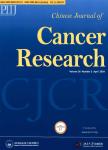Postoperative complications and weight loss following jejunostomy tube feeding after total gastrectomy for advanced adenocarcinomas
Postoperative complications and weight loss following jejunostomy tube feeding after total gastrectomy for advanced adenocarcinomas作者机构:Cancer Center Department of Surgery University Medical Center Utrecht PO Box 85500 3508 GA Utrecht the Netherlands Internal Medicine and Dermatology Department of Dietetics University Medical Center Utrecht PO Box 85500 3508 GA Utrecht the Netherlands Correspondence to R van Hillegersberg MD PhD. Department of Surgery University Medical Centre Utrecht G04.228 PO Box 85500 3508 GA
出 版 物:《Chinese Journal of Cancer Research》 (中国癌症研究(英文版))
年 卷 期:2017年第29卷第4期
页 面:333-340页
核心收录:
学科分类:1002[医学-临床医学] 100214[医学-肿瘤学] 10[医学]
主 题:Gastric cancer total gastrectomy jejunostomy tube feeding weight
摘 要:Objective: Patients undergoing total gastrectomy for cancer are at risk of malnourishment. The aim of this self- controlled study was to examine the effect of jejunostomy tube feeding (JTF) and other factors on postoperative weight and the incidence of jejunostomy-related complications in patients undergoing total gastrectomy for cancer. Methods: All consecutive patients who underwent total gastrectomy for gastric cancer with jejunostomy plaeement were included from a prospective single-center database (2003-2014). Jejunostomy-related complications and postoperative weight changes were evaluated up to 12 months after surgery. Multivariable linear regression analysis was performed to identify factors associated with weight loss 12 months after gastreetomy. Results: Of 113 patients operated in the study period, 65 received JTF after total gastrectomy for a median duration of 18 d [interquartile range (IQR), 10-55 d]. Jejunostomy-related complieations occurred in 11 (17%) patients, including skin leakage (n=3) and peritoneal leakage (n=2), luxation (n=3), occlusion (n=2), infection (n=l) and torsion (n=l). In 2 (3%) patients, a reoperation was needed due to jejtmostomy-related complications. The mean preoperative weight of patients was 71.8 kg (100%), and remained stable during JTF (73.9 kg, 103%, P=0.331). After JTF was stopped, the mean weight of patients decreased to 64.9 kg (90%) at 12 months after surgery (P〈0.001). A high preoperative body mass index (BMI) (〉_25 kg/m2) was associated with high postoperative weight loss compared to patients with a low BMI (〈25 kg/m2) (16.3% vs. 8.6%, P=0.016). Conclusions: JTF can prevent weight loss in the early postoperative phase. However, this is at the prize of possible complications. As weight loss in the long term is not prevented, routine JTF should be re-evaluated and balanced against the selected use in preoperatively malnourished patients. Special attention should be paid to patients with a high preoperative BMI, who ar



